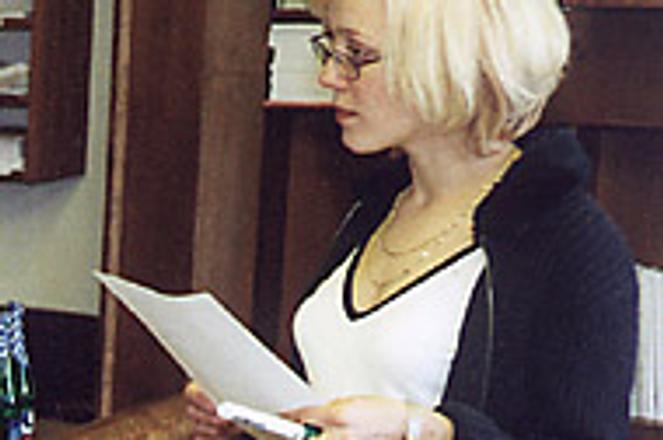Rudolf Bauer (left) and former Finance Minister Sergej Kozlík (right) do battle with the English language three times a week.photo: Ján Svrček
It's early Thursday morning, and six Slovak members of parliament [MPs] sit eyeing a text when a brusque, authoritative voice signals that the time for decisions has come.
"Are both boys going to the discotheque tonight?"
The MPs glance from side to side, build consensus, and answer in unison, "Yes, yes."
"Who will pay for the tickets?"
Silence.
"Who will pay for the tickets?"
"Tibor will pay for the tickets," says a member of the ruling coalition Party of the Democratic Left (SDĽ), gesturing at Tibor Cabaj of the opposition Movement for a Democratic Slovakia (HZDS).
Such is the scene in parliament three times a week as 25 Slovak MPs in three classes abandon political squabbles to unite in battle against the English language. Lessons begin at 7:30 on Wednesday, Thursday and Friday during parliamentary sessions and run to 9:00, when MPs sprint to their parties' clubhouses to change from pupils into politicians.
"We get along really well during the lessons," said Cabaj. "If politics are like a soccer match, then these lessons are like the beers the two teams share after the game."
The classes began last fall as part of a European Union programme created to raise the abilities of legislators in countries applying for EU membership to work with other European countries. When the programme was conceived in 1997, language was identified as one of the weaknesses shared by Slovak politicians.
"MPs in their 40s and 50s have trouble communicating in foreign languages," said Silvia Matúšova of the Foreign Assistance Department of the Slovak Government Office. "Very few of them can communicate effectively in a foreign language."
Contact with transatlantic organisations have increased in recent years after the coalition that took power in 1998 made joining NATO and the European Union priorities. MPs say it has made them realise the importance of learning English.
"Learning English is a must - it's the world's Esperanto," said HZDS MP Dušan Jariabek. "Having to talk through an interpreter limits communication. When visitors come to the Slovak parliament, being able to speak at least some English helps break the ice."
Most MPs over 30 learned Russian while growing up, but English was scarcely taught in Czechoslovak schools. Those in a recent morning class estimated that only 10% of Slovakia's 150 MPs speak English well.
"In today's world, one has to speak English," said the SDĽ's Jana Halušková. "There was an English MP here last year, and I couldn't say a word to him, not even 'Nice to meet you' or 'What time is it?' I realised I had to start learning."
With hectic parliamentary schedules, finding time to take out-of-house English courses is impossible for most MPs, which is why they are glad to have lessons at work. "Starting classes here in parliament was an excellent idea," said Jariabek. "And morning is the right time to learn because our minds are fresh."
Programme teacher Erika Sekorová said that it was a testament to the MPs commitment to learning that they made it to the lessons at all. "They work long, hard hours. Sometimes they are up until one the night before, and they usually still make it for early lessons," she said.
She added praise for her high-profile pupils: "MPs enjoy the lessons very much, and are willing to be taught, which is the most important thing. They have made great progress."
PHARE money allocated for the lessons will run out in June, but MPs now taking lessons, who say reading newspapers and watching CNN or BBC in the evening is simply not enough to learn English, are hoping to keep the programme afloat with alternative funding.
"It's very important for us to have daily contact with the language," said HZDS MP Sergej Kozlík at the end of a recent morning lesson. "I have English in my eyes, but I don't have English in my ears or mouth." To which Christian Democratic Movement MP Rudolf Bauer joked: "We have ear and mouth disease."
Bauer, Kozlík, and 23 other MPs are hoping morning English lessons will provide the cure.


